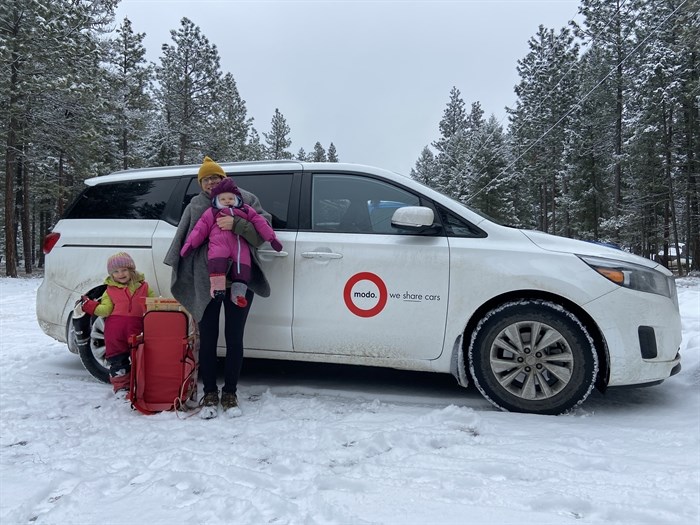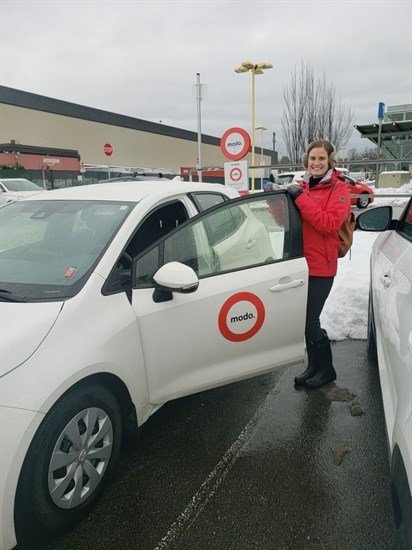
Christian Brandt is Modo's sole employee in Kelowna and was involved with the city's original OGO coop. He's using a Modo car here to take his family to Big White.
Image Credit: Submitted/Modo
February 15, 2021 - 7:00 AM
The car sharing movement in B.C. is largely in the hands of a co-op called Modo that’s striving to cut down on the number of personally owned vehicles in the province’s largest cities.
Right now that includes 15 cars in Kelowna out of a fleet of 700. All the rest are in the Lower Mainland and on Vancouver Island.
“For every Modo that comes into a neighbourhood, about 10 cars are shed,” Selena McLachlan, director of marketing and communications for Modo told iNFOnes.ca. “Most personally-used cars are used five per cent of their life so it’s a depreciating asset sitting in your driveway. We’re hoping we can provide affordability and convenience and, hopefully, something more sustainable for communities.”
Car sharing started in Vancouver with a 16-member co-op in that city’s West End with two used cars in 1997. That evolved and grew into Modo.
In Kelowna, the OGO coop started in about 2013 and merged with Modo in 2015.
Because of COVID, people are driving less so there are no current plans to expand the fleet. That will have to rely on developers who, in Kelowna, can save five parking spaces for each Modo car they bring in.
While Modo isn’t the only car-share operation in B.C., it has a long history of reliable service so is generally the preferred choice for such projects, McLachlan said.
As an example, in Kelowna, the proponents of a 46-storey downtown highrise called 2020 propose to include six car share spaces in order to eliminate 30 regular parking stalls.
“It’s a win-win,” McLachlan said. “It’s a win for the city for their transportation demand planning. It’s a win for the developers. They save money. It’s a win for the people moving in.
“They can free up $600 to $700 a month that they would otherwise be paying to own and operate a car and put it into their housing. Maybe they can afford to rent a bigger place or buy a two bedroom instead of one bedroom.”
It costs $9,000 to $10,000 to own a car in Vancouver, McLachlan said. She didn’t have figures for Kelowna. Modo members spend $600 to $700 per year renting their cars.
Developers in Vancouver can save in the range of $200,000 for each Modo car they put in. In exchange, Modo gets a free parking space in perpetuity and, sometimes, the builder will buy or subsidize the car for them.
Having a car in their building makes it more likely that residents will join the co-op but the vehicles are available to any member, not just those in that building. That makes more vehicles more accessible in more locations.
Traditionally, Kelowna is a car-oriented city, McLachlan said. But, as its density increases in core areas, car sharing becomes more practical.
“In order for round trip car sharing to work, you need to have densification, walkable neighbourhoods and good transit,” McLachlan said.
Nanaimo is the only city on Modo’s list that’s outside a major metropolitan area. That’s because Modo has a policy of having cars at the main ferry terminals so people don’t have to pay to take their cars on the ferries.
In Nanaimo, Modo cars are also parked in the downtown and waterfront areas of that city since it’s not feasible to have them, for example, at the malls sprawled along the highway or in single-family neighbourhoods.
The ideal locations, McLachlan said, are in mixed commercial and residential areas where businesses use them during the day while residents tend to use them more in the evenings and on weekends.
In order to get a viable car share running, there generally needs to be a minimum of three cars in the pool. That can require dozens, if not hundreds, of members to make it viable.
If people want to start their own co-op, Modo is quite willing to help with the technology and advice. Many local co-ops, like OGO in Kelowna, had that assistance before merging with the larger co-op.

Maria Adey rented a Modo car to go furniture shopping in Kelowna.
Image Credit: Submitted/Modo
Modo started off with a lock box on each car to hold its key. Members were given keys to the lock box. Time and distance were billed on the honour system.
It has since developed technology so the cars can be booked through an app, online or by phone and members are given fobs to gain access. On-board devices track time, distance and location so the members can be billed.
“The single biggest barrier to starting a car share, despite what people think – they think it’s cars. It’s not. It’s actually the software and hardware,” McLachlan said.
To become a member, people can either buy a $500 refundable membership and pay $4 per hour for most vehicles plus mileage. Or they can pay $6 a month and $5 an hour plus mileage to use a vehicle. They pay the monthly fee whether they use the car or not.
There are also options for businesses. The City of Kelowna is among their clients.
It’s ideally suited to people who normally take transit or ride their bikes to work, or as a second vehicle.
It’s not set up as a commuter vehicle since it would be too expensive to pay to have it sit all day.
There are services like an overnight option. If someone decides against taking transit home from work or riding their bike, they can hop in a Modo after 7 p.m. and only pay for three hours overnight.
There are also “daytripper” options for people to get a break on longer trips to the country or ski hills.
Fleets include larger vehicles, like vans and pick-ups, but a member has to get to that vehicle’s location on their own and return it to the same spot.
Only about one quarter of the fleet is hybrid or electric but the target is to be fully electric by 2030.
In Kelowna, the cars are parked in five “regions” with six vehicles in the downtown core, four in the South Pandosy area, two in Glenmore, two at Capri/Landmark and one in the Academy Way/UBCO area.
“We believe that it’s substantially reducing the number of privately owned vehicles in a neighbourhood,” McLachlan said. “Now, as Kelowna gets denser and there’s more building and there’s more competition for use of the road and space, we hope that fewer people will own cars and be more interested in taking active forms of transportation and public transit and using Modo when they need to do a big shopping run or recreate outdoors.”
For more information, go here.
To contact a reporter for this story, email Rob Munro or call 250-808-0143 or email the editor. You can also submit photos, videos or news tips to the newsroom and be entered to win a monthly prize draw.
We welcome your comments and opinions on our stories but play nice. We won't censor or delete comments unless they contain off-topic statements or links, unnecessary vulgarity, false facts, spam or obviously fake profiles. If you have any concerns about what you see in comments, email the editor in the link above.
News from © iNFOnews, 2021